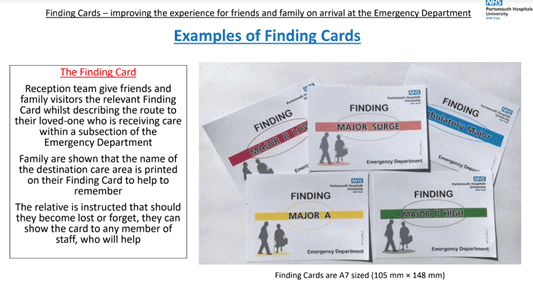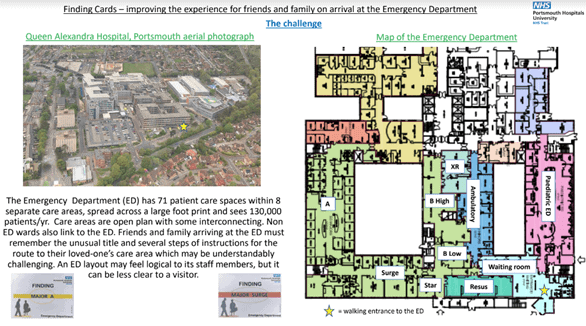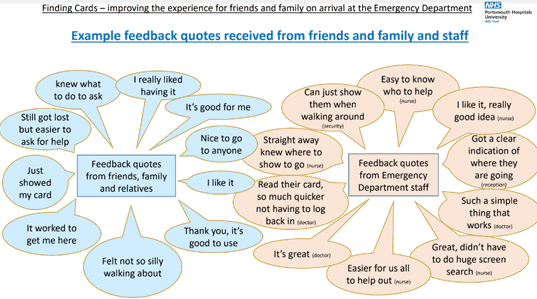Finding Cards – Improving the experience for friends and family on arrival at the Emergency Department
Queen Alexandra Hospital, Portsmouth Hospitals University NHS Trust

Contact: Joanna Rowlinson - joanna.rowlinson@porthosp.nhs.uk
Organisation
Using insight for Improvement Category Winner 2022
Winner – Using Insight for Improvement
Sub Category: Access
Queen Alexandra Hospital in a large District General Hospital on the south coast of England providing care to people across the city of Portsmouth and south east Hampshire. The Emergency Department (ED) sees 130,000 patients per year. The ED provides care for the immediate assessment, diagnosis and treatment of adult and paediatric patients presenting with serious and life-threatening illnesses and injuries. The department is open 24 hours a day, seven days a week, with consultant-led emergency care. The ED team is large and includes 18 consultants, 52 Doctors in training, over 150 nurses and nurse practitioners, and further allied support staff. The department has a dedicated 6 bed Resuscitation area, 42 Majors beds spread across 4 major treatment areas (Majors A, Majors B Low, Majors B High, Majors Surge), an ambulatory seated care area with 12 chairs, waiting room and a dedicated 11 bed children’s emergency department. The corridors connecting bed space treatment areas are interconnecting, opening into bays of care area bedspaces, spread across a very large footprint.
General Summary
Finding Cards are a fresh idea, dedicatedly focused on addressing needs and emotional support of friends and family when first arriving at a busy Emergency Department(ED). Cards given to family in reception help family remember their patient’s named location, reassure and give confidence that help is available if they become lost, empower to approach any staff for help, and make feel at ease. Proactive engagement, surveying and collection of feedback from family and staff was reflected upon. Feedback was globally positive with multiple enthusiastic comments. The uncomplicated inexpensive straightforward nature enabled the Cards to be easily implemented without lengthy meetings, additional staff recruitment, training or funding. Finding Cards also improved patient safety through minimising staff interruptions. Staff quickly read the card, immediately help with onward direction, avoiding lengthy database searches, shortening interruptions. The Cards also improved staff experience. Finding Cards are a creative solution addressing a common problem and are easily adoptable by many healthcare settings. The tool is very easy to sustain, only requiring card reprinting and restocking. The tool has proactively been shared locally and internationally. Following the observed benefit to friends and family and staff, Finding Cards are now routinely given to every visitor entering the ED.

Rationale
Finding Cards are a creative solution to improve the support and experience for friends and family when first arriving at our large Emergency Department(ED). They vitally remove a layer of worry, confusion, stress and unease for friends and family when trying to first find, and see, their loved-one who is receiving treatment within one of the many subsections of the busy ED.
As an ED Consultant I frequently observed friends and family repeatedly became lost, and also forget the name of their destination after their welcome at the ED reception, despite receiving directions and signs. Formal hospital CQC inspections also commented they observed people becoming lost and confused. Relatives understandably interrupted staff for help, or were found disorientated, unaware who to approach. We felt it was essential to introduce a new solution that focuses on improving the support we are giving to friends and family arriving at our ED, to make their initial experience less stressful and challenging, and feel more welcomed and valued in the ED.
“Finding Cards” were the novel and innovative solution. The simple, inexpensive, coloured cards are A7 sized. The top of the card reads ‘FINDING’. The centre of the card has printed the name of a specific subsection of the ED e.g. ‘Major A’, ‘Major B-High’. The reception team gives visitor friends and family a relevant bespoke card whilst describing the route and signage to their patient. The relative is shown that the name of the care area where their patient is located is printed on their Finding Card to help remember the name. The relative is instructed that should they become lost or forget, they can show their Finding Card to any member of staff, who will happily help. The Finding Cards helps friends and family remember their loved-one’s location, reassures and gives confidence that help will be available if they become lost, empowers relatives to approach any staff member for help, and supports relatives to feel at ease.
Friends and family unexpectedly coming to hospital following hearing of a health emergency, often yet to discuss the seriousness can feel overwhelmed. It is a time of heightened emotion and worry. Remembering the unusual title and several steps of instructions for the route to their loved-one may be understandably challenging. They must navigate multiple corridors, doorways, and unfamiliar signs which can feel confusing and can feel further distressing and frustrating if become lost. ED layout and signs may feel logical to staff, but can be less clear to visitors. The naturally busy and dynamic environment of an ED can appear chaotic to visitors. It may be unclear which uniformed member of staff to interrupt and approach, thus relatives feel daunted and isolated. A patient in the ED may worry about the burden their health emergency may have upon their family. Steps to ensure friends and family have a positive ED experience are also very important to the patient. During times of NHS pressures it is equally important to include innovation specifically for friends and family. Finding Cards are a completely new fresh idea within the field of emergency medicine, dedicatedly focused on addressing further the needs and support of friends and family when first arriving at an ED.
In addition, Finding Cards also improved patient safety by minimising interruptions to doctors and nurses. To identify a patient’s bed location when staff are asked for help, they must undertake a dedicated ED computer database search taking several minutes, due to the multiple care areas and large number of patients within our ED. This interruption distracts medical and nursing staff from their current task and workflow. Interruptions are harmful for patient safety and contribute to negative consequences including drug errors, delayed treatment, and loss of concentration. Through using Finding Cards, doctors and nurses can quickly read the card and immediately help relatives with onward direction. A repeated database search not needed. The length of interruption is shorter. Finding Cards also allow more ED staff to help with onward directions (including housekeeping, security) as access to confidential database is no longer required. Finding Cards also improved staff experience.

Planning
Finding Cards implementation didn’t need lengthy planning, training, budgeting and meetings and was relatively quick and simple. The idea was discussed with the senior nurse and reception team manager who were very supportive to proceed. The cards were designed using powerpoint. Complex IT skills and software were not required. The hospital medical photography department printed and cut A7 sized cards, costing £25 per 1000 A7 cards. Initially 6 different care area’s Finding Card sub types were printed. Once printed, Cards were kept next to reception staff in accessible boxes, ready to be used. Cards were reused or disposed.
Consultants, senior nurses and reception leads were briefed further on the project. Simple short briefings were then given to the wider team at handovers by the team leaders to make all groups, including reception, nursing, and medical teams, aware of Finding Cards. These briefings took less than 5 minutes and included discussing the current friend and family experience, the problems they encountered, the staff interruptions and patient safety, whilst demonstrating the cards. Briefings were repeated several times each week during the initial introduction phase. Adhoc reminders and demonstrations were also given to staff throughout shifts. Open communication and discussion were encouraged throughout. As the concept and cards were uncomplicated, formal ‘training’ was not needed. Emails to the team included images of the Finding Cards. These methods overcame the challenge of reaching the breadth of an entire ED multidisciplinary team working shifts 24hours/day 7days/week.
Card printing became more predictable and plannable once the frequency used of each Card subtype became apparent during the first weeks. During the initial pilot, a map of the department was printed on the reverse of the card. We became aware from family feedback that the map was rarely consulted and did not add to the overall aim of the card. Subsequent cards read solely the title of a patient care area.
Feedback comments were collated from family and staff, and all comments were proactively reviewed and reflected on.

Impact
Feedback from friends and family was globally positive. Informal surveys asked for feedback following using a Finding Card to arrive at their specific care area. Verbatim accounts of all comments were collected. The theme from relatives was how much they liked the cards. They felt more encouraged and able to ask for help and less troubled reaching loved ones. Families asked to keep cards when going for coffee for reassurance in case needed help on return. Following feedback that the map did not have any added value, cards were promptly changed.
Staff feedback was gathered through team briefings, informal surveys, interviews and email. Staff stated it was immensely quicker to support relatives and saved time. The team found cards easy to recognise, uncomplicated and straightforward to use. It was much easier to identify relatives in need of help and support. Family members appeared very comfortable when they approached staff. The reception team observed relatives appeared more confident and reassured to enter the main ED. Staff acknowledged the easily adaptable nature of Finding Cards as when bedspace treatment areas were renamed, newly printed cards were available within a few days.
Given the observed benefit to both friends and family and staff groups, Finding Cards with explanations are now routinely given to every visitor entering the ED.
Standing Out
Finding Cards are a completely new fresh idea within the field of emergency medicine, focused on the needs, well-being and emotional support of friends and family when first arriving at a busy ED. Being in an ED as a relative is a time of heightened emotion and worry for family also about to providing comfort to their loved one who is receiving emergency care. It is essential to take all possible opportunities to support friends and family. This uncomplicated innovative project specifically and visibly reaches out to this group.
Finding Cards are easily transferable to any other healthcare setting and require no marked additional funding, staffing and training and are future proof. This makes this initiative particularly unique. The ease of communicating and adopting the tool for a large multidisciplinary team working 24/7 adds to the initiative’s success.
The further benefits of improving staff experience, and improving patient safety by minimising interruptions to doctors and nurses, is also hugely significant.
Key Learning Points
A department’s layout and signs may feel logical to the staff, but reaching out to friends and family may identify the need to provide additional support. Finding Cards are low cost and don’t necessitate extensive additional training, staff recruitment, finance and resources to implement. Teams should therefore not feel nervous when considering introducing. Reprinting and designing cards is undemanding for the project lead. Simple card designs were the most effective. Costs can be reduced through using thinner, black and white cards. Collecting feedback from friends and family and staff during pilot phases will give valuable insight to the specific bespoke needs.
